8 Best SEO Ecommerce Platforms to Boost Your Online Sales
Ready to Rank Higher? Explore the Top SEO Ecommerce Platforms
Dominating search engine results is the holy grail of e-commerce success. Achieving that coveted top spot, however, isn't about luck; it's about choosing the right tools. Your e-commerce platform is the foundation of your online store, and its SEO capabilities can make or break your visibility. Are you struggling to attract organic traffic? Tired of seeing competitors outrank you for crucial keywords? Choosing an SEO-friendly e-commerce platform is the first step to conquering the search landscape and driving sustainable growth.
Choosing a platform that not only looks good but also performs well under the hood is a problem many online businesses face. Factors like site speed, mobile responsiveness, customizable URLs, structured data implementation, and robust blogging functionality are critical for SEO success. A truly effective platform empowers you to optimize product pages, manage metadata, build high-quality backlinks, and integrate seamlessly with other marketing tools.
Pricing models, technical requirements, and scalability should also factor into your decision. These elements can significantly impact your long-term success. Finding the right balance between functionality and affordability is key.
This article dives deep into the eight best SEO e-commerce platforms available. It aims to provide e-commerce entrepreneurs, digital marketers, online retailers, product managers, content creators, and even seasoned Shopify and dropshipping store owners with the insights they need to choose wisely. We'll explore the pros and cons of each platform, highlighting their key SEO features, pricing considerations, and technical nuances.
By the end of this guide, you’ll be equipped to choose the perfect platform to propel your online store to the top of search engine rankings and unlock its full potential. You'll understand how to make informed decisions about your e-commerce platform and leverage its SEO capabilities to drive more organic traffic and increase sales.
1. Shopify

Shopify is a leading e-commerce platform known for its user-friendliness and robust SEO capabilities. Whether you're launching your first online store or managing an established business, Shopify offers the tools to improve your search engine rankings and attract organic traffic.
Shopify's built-in SEO features provide a solid foundation for optimization. You can easily customize essential on-page elements like meta titles, descriptions, and URLs. The platform automatically generates your sitemap, which helps search engines like Google understand and index your website's structure. This automation saves time and ensures your site is easily crawlable.
Shopify's mobile-optimized themes are another key advantage. They ensure your store looks great and functions seamlessly on any device, an important factor in today's mobile-centric online world. Managing 301 redirects is also straightforward, preserving your SEO equity when updating URLs. For content marketing, Shopify provides built-in blog functionality, empowering you to create engaging content that attracts your target audience.
Advanced SEO With Shopify
For more specialized SEO needs, Shopify has a vast app ecosystem. Need to implement structured data markup? There's an app for that. Looking for powerful keyword research tools? The Shopify app store has you covered. This extensibility allows your store to adapt to the constantly evolving world of SEO. For a deeper understanding of sitemaps and their importance, check out our guide on sitemaps.
Features:
- Customizable URLs, meta titles, and descriptions
- Automatic sitemap generation
- Mobile-optimized themes
- 301 redirects management
- Blog functionality for content marketing
Pros:
- Easy to use for beginners: Shopify's intuitive interface simplifies SEO management, even without technical expertise.
- Excellent page load speed: Fast loading times are essential for SEO, and Shopify's infrastructure and optimized themes deliver.
- Built-in analytics and reporting: Monitor your SEO performance directly within your Shopify dashboard.
- Large app ecosystem for extending SEO capabilities: Access a diverse range of SEO apps to enhance your optimization strategy.
Cons:
- Monthly subscription costs add up: Shopify's monthly fees, combined with potential app costs, can strain your budget.
- Some advanced SEO features require paid apps: Certain specialized features require subscriptions to third-party apps.
- URL structure isn't fully customizable: Product and collection URLs have a fixed structure, potentially limiting some SEO strategies.
Website: https://www.shopify.com
Shopify is a strong choice for e-commerce businesses of all sizes. The user-friendly platform, powerful SEO features, and extensive app store make it an excellent platform for organic growth. While pricing and URL customization limitations may be considerations, the overall benefits and ease of use make Shopify a top contender in the e-commerce platform landscape.
2. WooCommerce
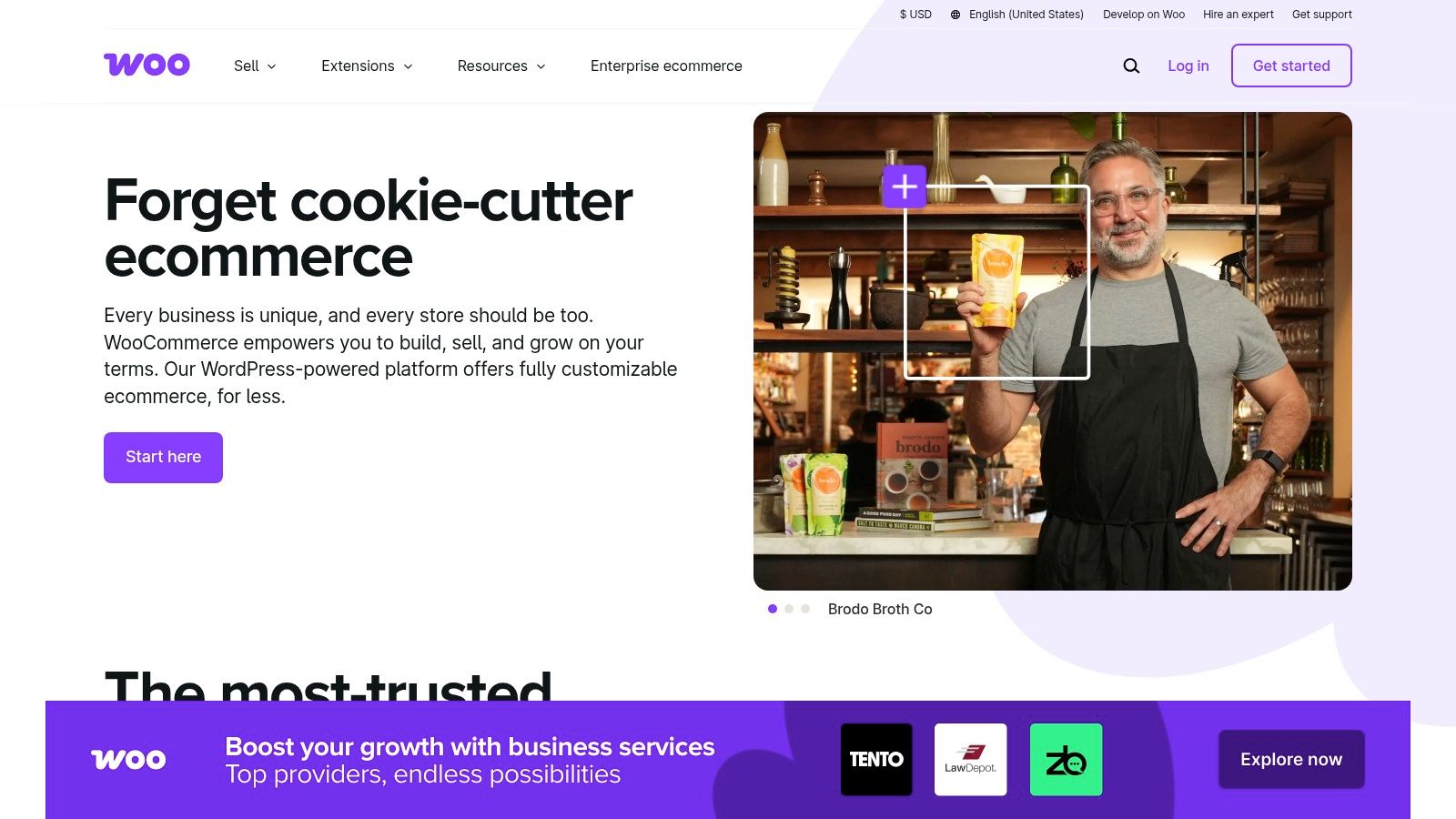
WooCommerce earns its place on this list as the top open-source e-commerce solution for WordPress, providing exceptional flexibility and control over your online store's SEO. While platforms like Shopify offer a more streamlined, pre-built experience, WooCommerce gives users extensive customization options. This makes it an excellent choice for those with technical skills or the resources to invest in development. It's especially appealing to e-commerce entrepreneurs, digital marketers, and online retailers seeking precise control over their SEO strategy.
WooCommerce effectively transforms your WordPress website into a fully operational online store. It utilizes WordPress's existing content management capabilities and SEO strengths, bolstered by a wide selection of plugins specifically designed for e-commerce SEO. Imagine building your store with Lego blocks – you have all the individual components to create exactly what you want.
Features and Benefits
-
Complete Access to Website Code: Unlike closed-source platforms, WooCommerce gives full access to the underlying code. This allows developers to apply advanced SEO techniques and customize the store to meet unique needs. For example, you could implement schema markup for rich snippets tailored to your product categories, boosting search visibility.
-
Integration with Powerful WordPress SEO Plugins: WooCommerce integrates seamlessly with leading SEO plugins like Yoast SEO and Rank Math. These tools provide comprehensive on-page optimization features, including keyword analysis, XML sitemap generation, and meta tag management.
-
Customizable Permalink Structure: Clean, SEO-friendly URLs are essential for ranking. WooCommerce lets you customize your permalink structure to incorporate relevant keywords and categories, improving both user experience and search engine crawlability.
-
Rich Snippet Capabilities: Improve your search listings with rich snippets, displaying extra information like product prices, ratings, and availability directly in search results. This enhances click-through rates and attracts more qualified traffic to your store.
-
Full Control over Content Organization: Strategically organize your products, categories, and tags to improve site architecture and internal linking. This helps search engines understand your site structure and index your content effectively.
Pros
-
Free to Install and Use (Hosting Costs Apply): The WooCommerce plugin is free, which significantly lowers the initial investment compared to other platforms. Keep in mind that hosting costs will apply, varying depending on your provider and traffic.
-
Highly Customizable for SEO Experts: The extensive customization makes WooCommerce perfect for SEO experts who want granular control over their online store's optimization.
-
Extensive Plugin Ecosystem: Thousands of plugins address specific needs, extending your store's functionality and offering further SEO enhancements.
-
Full Ownership and Control of Data: With WooCommerce, you retain complete ownership and control of your store's data, unlike hosted platforms.
Cons
-
Requires More Technical Knowledge to Fully Optimize: Setting up the basics is relatively simple. However, maximizing WooCommerce's SEO potential requires some technical expertise or a developer.
-
Optimization and Maintenance Responsibility Falls on the Owner: You are responsible for ongoing maintenance, updates, and security, which can demand time.
-
Can Slow Down with Too Many Plugins: Relying too heavily on plugins can negatively impact site speed, affecting both SEO and user experience. Choose plugins carefully and optimize for performance.
-
Requires Separate Hosting Solution: You will need to select and manage a separate hosting plan for your WooCommerce store.
Implementation/Setup Tips
- Choose a Reliable and Fast Hosting Provider: Site speed is a critical SEO factor.
- Install Essential SEO Plugins: Yoast SEO or Rank Math are great options to start with.
- Optimize Product Descriptions and Meta Tags: Use relevant keywords and compelling product descriptions.
- Structure Your Product Categories and Tags Logically: Consider both user experience and search engine crawlability.
- Regularly Monitor Your Site's Performance: Keep track of key metrics like organic traffic, keyword rankings, and conversion rates.
Website: https://woocommerce.com
For those migrating from Shopify or other platforms and wanting more control over their SEO and a scalable solution, WooCommerce provides a compelling alternative. While the technical learning curve might be steeper, the potential gains in SEO performance and customization make it a valuable investment for serious e-commerce businesses.
3. BigCommerce
BigCommerce is an enterprise-grade ecommerce platform designed for significant SEO control. Unlike platforms that restrict technical optimization, BigCommerce prioritizes it, making it ideal for businesses focused on organic growth. This platform is particularly suited for e-commerce entrepreneurs, digital marketers, and online retailers who value technical SEO and need a scalable platform. Even for dropshipping businesses and product managers, the control offered by BigCommerce can significantly improve search visibility and sales.
BigCommerce excels with its robust built-in SEO features, often costly add-ons with other platforms. This built-in SEO focus is key, providing the tools needed to compete effectively in search.
Key Features for SEO Success
-
Fully Customizable URLs (No Prefixes!): A major SEO advantage. BigCommerce allows complete URL customization, unlike platforms with forced prefixes. This enables clean, keyword-rich URLs that are user-friendly and SEO-optimized. For example, instead of
yourstore.com/products/1234/blue-widget, you can haveyourstore.com/blue-widget, improving readability and SEO. This control is crucial for keyword targeting and site architecture. -
Built-in Microdata for Rich Snippets: BigCommerce automatically implements schema markup (microdata) for product information, reviews, and more. This allows search engines to understand your content, leading to rich snippets in search results. These enhanced listings with star ratings, pricing, and availability can significantly improve click-through rates.
-
Automatic 301 Redirects: Managing redirects is vital for SEO when changing URLs. BigCommerce automates 301 redirects, preserving link equity and preventing broken links.
-
CDN for Faster Loading: BigCommerce uses a Content Delivery Network (CDN), ensuring fast website loading speeds globally. Page speed is a crucial ranking factor, and a CDN improves user experience and SEO.
-
AMP Support for Mobile Optimization: Accelerated Mobile Pages (AMP) create a streamlined mobile experience. BigCommerce supports AMP, boosting mobile SEO, which is essential in today's mobile-centric online environment.
Pros
- Enterprise-Level SEO Tools Included: Essential SEO functionality is standard across all plans.
- Excellent Server Performance and Uptime: Reliable hosting ensures constant site availability.
- No Transaction Fees: BigCommerce doesn't take a cut of your sales.
- Multi-Channel Selling: Easily integrate with Amazon, eBay, and other marketplaces.
Cons
- Higher Pricing: BigCommerce can be more expensive than entry-level platforms.
- Limited Free Themes: Fewer free themes may necessitate a premium theme purchase.
- Annual Sales Limits: Each plan tier has sales limits, requiring potential upgrades.
- Steeper Learning Curve: The feature set can be challenging for beginners.
Implementation Tips
- Plan Your URL Structure: Create a logical and SEO-friendly site architecture.
- Utilize Built-in SEO Settings: Optimize meta descriptions, title tags, and other elements.
- Monitor Site Performance: Track keyword rankings, traffic, and conversions.
Pricing
BigCommerce offers plans starting from approximately $29.95/month. Pricing and features vary by plan. See their website for current details.
Website
BigCommerce is built for ecommerce businesses prioritizing organic growth. Its robust SEO features, especially full URL control, are a significant advantage. While potentially more complex and costly than some alternatives, the control and scalability make it a valuable investment for businesses with long-term SEO goals. If migrating from a platform like Shopify for greater SEO control, BigCommerce is an excellent option.
4. Magento (Adobe Commerce)
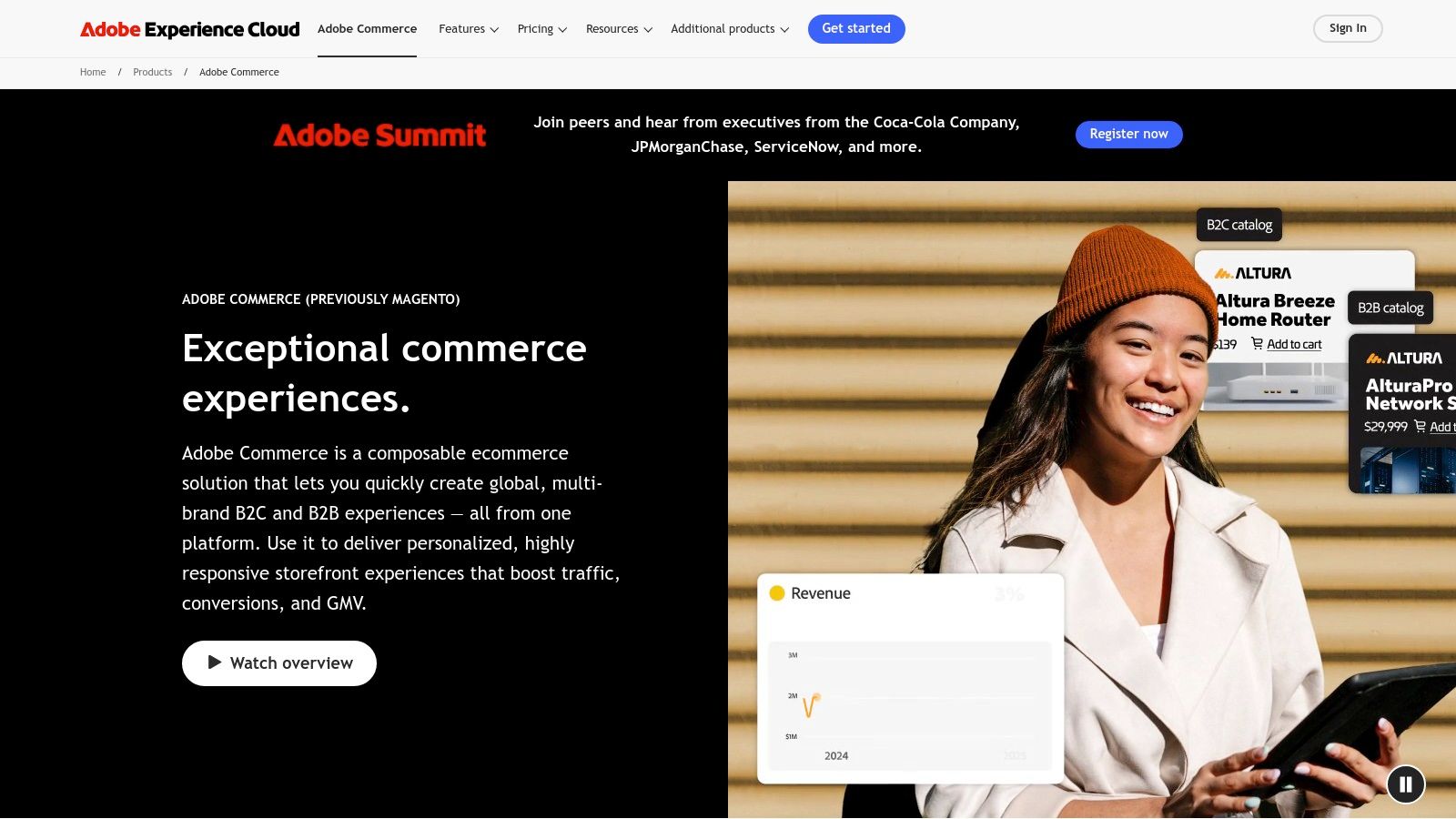
Magento, now known as Adobe Commerce, is a powerful eCommerce platform ideal for businesses with ambitious growth strategies and complex needs. Unlike simpler platforms, Magento provides exceptional flexibility and control over virtually every aspect of your online store, including vital SEO components. While this power comes with a steeper learning curve and higher initial costs, the potential benefits for large catalogs and enterprise-level businesses are significant.
Magento excels at managing large product catalogs with numerous attributes, an area where many other platforms struggle. Its robust layered navigation, for example, enhances the user experience while simultaneously offering SEO advantages by creating clean, keyword-rich URLs for filtered product categories. Additionally, features like built-in canonical tags and advanced URL rewriting give you precise control over your site's SEO structure. This minimizes duplicate content issues and boosts search engine visibility. This is especially important for large eCommerce websites where manual management of these elements would be overwhelming.
For global businesses, Magento's multi-store functionality supports localized SEO strategies. You can tailor content, currency, and even URL structure for specific regions, creating a targeted and effective international SEO approach. For further insights into sitemap structure and SEO, consider exploring resources like Our guide on WP Sitemap Taxonomies.
Features
- Complete customization of all SEO elements
- Advanced URL rewriting capabilities
- Built-in canonical tags and indexing controls
- Layered navigation with SEO benefits
- Multi-store management with localized SEO
- Powerful caching system for speed optimization
- Advanced user permissions and workflows
Pros
- Unlimited customization potential
- Ideal for large, complex product catalogs
- Powerful caching system for speed optimization
- Advanced user permissions and workflows
Cons
- Requires considerable technical expertise
- High implementation and maintenance costs
- Demands powerful hosting infrastructure
- Substantial development costs
Pricing
Adobe Commerce (Magento) pricing is quote-based and depends on business size and complexity. Anticipate significantly higher costs than SaaS platforms like Shopify.
Technical Requirements
Magento requires a dedicated server with specific software dependencies (PHP, MySQL, etc.). Technical expertise is necessary for installation, configuration, and maintenance.
Implementation Tips
-
Plan meticulously: Thorough planning is essential due to Magento's complexity. Define your SEO requirements, map your site structure, and select a qualified development partner.
-
Invest in robust hosting: Magento's performance depends heavily on powerful server infrastructure. Avoid inadequate hosting to prevent performance issues that negatively affect SEO.
-
Utilize extensions wisely: Magento's marketplace offers a wide range of extensions. However, choose carefully. Excessive extensions can negatively impact site performance.
Website
https://business.adobe.com/products/magento/magento-commerce.html
Magento is not a universal solution. Its complexity makes it unsuitable for smaller businesses or those lacking dedicated technical resources. However, for large enterprises with complex catalogs and demanding SEO requirements, Magento's flexibility and control are unparalleled, justifying the investment and technical challenges.
5. Wix eCommerce
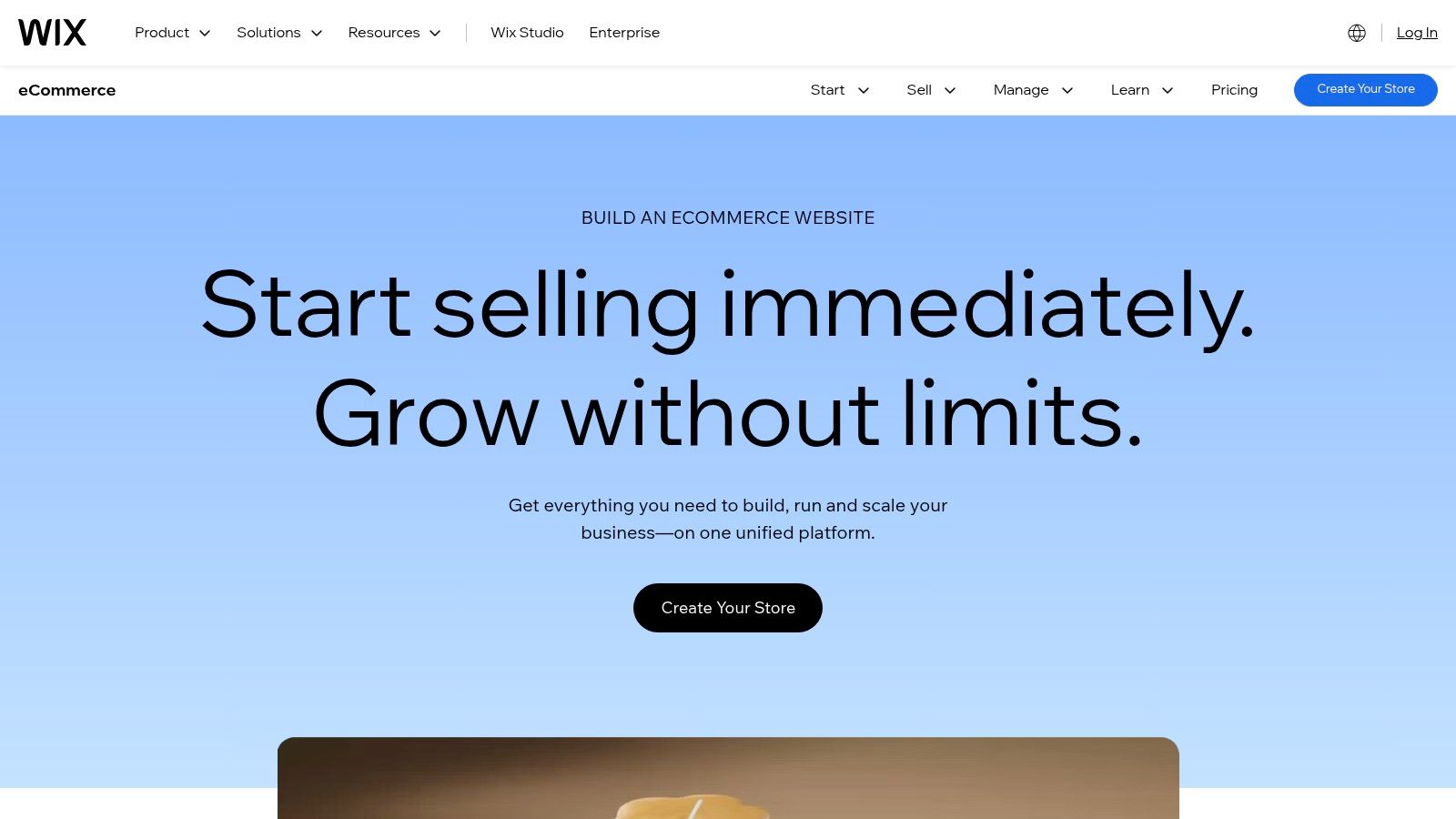
Wix eCommerce offers a compelling blend of user-friendliness and robust SEO capabilities. This makes it a strong option for businesses looking to establish an online store. While once known for prioritizing simplicity over SEO, Wix has significantly improved its SEO tools, making it viable even for SEO-conscious entrepreneurs. Its drag-and-drop interface and intuitive tools empower users with little coding experience to build and optimize their online stores.
This platform is especially well-suited for beginners and small to medium-sized businesses. It offers a quick and easy setup without sacrificing essential SEO functionalities.
Why Wix eCommerce Deserves Its Spot
Wix eCommerce has evolved into a much more SEO-friendly platform. Its simplified approach to website building, combined with its growing suite of SEO tools, makes it an attractive option for those new to e-commerce. It's also great for those seeking a hassle-free platform. The integrated SEO tools and checklists streamline the optimization process, allowing users to focus on other critical aspects of their business.
Features and Benefits
-
Intuitive SEO Setup Checklist: This guided checklist helps beginners navigate the initial SEO setup, ensuring they cover the fundamental aspects of optimization.
-
Customizable Meta Tags and URL Slugs: Control over meta titles, descriptions, and URL slugs allows for targeted keyword optimization and improved click-through rates from search engine results pages (SERPs).
-
Built-in Structured Data Implementation: Wix automatically implements schema markup, enhancing search engine understanding of your product information and potentially leading to rich snippets in search results.
-
Mobile Optimization: With built-in mobile optimization, your online store will look and function flawlessly across various devices, improving user experience and SEO performance.
-
Wix SEO Wiz: This tool provides personalized SEO plans and step-by-step guidance, simplifying the optimization process for beginners.
Pros
-
Very User-Friendly Interface: The drag-and-drop builder makes website creation and management incredibly easy, even for non-technical users.
-
No Coding Knowledge Required: You can build a fully functional online store without any coding.
-
Built-in Mobile Optimization: Ensures your store is accessible and performs well on all devices.
-
Integrated Marketing Tools: Streamlines marketing efforts with built-in tools for email marketing, social media integration, and more.
Cons
-
Less Flexibility for Advanced SEO Customizations: Compared to more developer-friendly platforms, Wix offers less control over the underlying code, which can limit advanced SEO tweaks.
-
Limited Access to Edit Underlying Code: This can restrict users needing granular control over their website’s technical aspects.
-
JavaScript-Heavy Sites Can Impact SEO Performance: Wix's reliance on JavaScript can sometimes result in slower page load speeds, potentially affecting SEO.
-
Not Ideal for Very Large Stores: While Wix can handle a substantial number of products, it might not be the best choice for extremely large catalogs with thousands of items.
Pricing and Technical Requirements
Wix offers various pricing plans, starting with basic free options and scaling up to premium plans with more features and bandwidth. E-commerce plans typically start around $27/month. (Check the Wix website for the most current pricing.) No specific technical requirements are needed as Wix is a fully hosted platform.
Comparison With Similar Tools
Compared to platforms like Shopify, Wix offers greater ease of use for beginners. Shopify, however, provides more advanced SEO customization options and is generally considered more scalable for larger stores. The choice between the two often depends on balancing ease of use with the need for advanced functionalities.
Implementation/Setup Tips
-
Utilize the Wix SEO Wiz: Take full advantage of the personalized recommendations and guidance.
-
Optimize Product Descriptions and Images: Use relevant keywords in your product descriptions and alt text for images.
-
Build a Blog: Creating valuable content related to your products can attract organic traffic and improve your site's SEO authority.
-
Monitor Your SEO Performance: Track your keyword rankings and website traffic to measure the effectiveness of your SEO efforts.
Website: https://www.wix.com/ecommerce
6. Squarespace Commerce

Squarespace Commerce stands out as the preferred platform for visually-focused brands. It allows businesses to prioritize aesthetics without sacrificing strong SEO performance. If striking visuals are central to your brand, and you need an all-in-one platform that doesn't demand advanced technical skills, Squarespace is a worthy contender. It offers a balance of sleek design and essential built-in SEO features. This makes it appealing to e-commerce entrepreneurs, artists, designers, and anyone selling products where presentation matters.
Consider businesses like lifestyle boutiques, photographers selling prints, or artisanal food producers. These are the kinds of businesses that truly thrive on Squarespace. While platforms like Shopify offer a wider array of apps and customization, Squarespace concentrates on a streamlined experience. This allows beautiful design and crucial SEO features to work together seamlessly.
Squarespace Commerce simplifies SEO with helpful features. Automatic sitemap generation, mobile optimization, and SSL certificates for all sites are included, handling much of the technical work behind the scenes. The platform also automates image alt text generation and structured data implementation. These are two vital components for improving search engine visibility and accessibility. You can further refine your SEO by customizing product URLs and meta descriptions.
Features
- Clean, SEO-friendly code structure
- Built-in SSL for all sites
- Automatic image alt text generation
- Customizable product URLs and meta descriptions
- Automatic structured data implementation
Pros
- Beautiful, Responsive Design Templates: Squarespace is known for its visually attractive and contemporary templates. This makes creating a professional online store easy.
- All-in-One Solution With Hosting Included: Simplify your operations with website hosting, domain registration, and e-commerce functionality all in one location.
- 24/7 Customer Support: Access support anytime you need it to help you resolve issues and navigate the platform effectively.
- Regular Platform Updates and Improvements: Squarespace continually updates its platform with new features and security enhancements. This ensures you always have the latest technology.
Cons
- Limited Advanced SEO Customization Options: Squarespace offers basic SEO tools, but may not give the fine-tuned control some advanced users need. This can be a limitation for businesses with intricate SEO strategies.
- Fewer Third-Party Integrations Than Competitors: Compared to platforms like Shopify, Squarespace has a smaller selection of apps and integrations. This might restrict options for expanding functionality.
- Higher Entry Price Point for Commerce Features: Squarespace's commerce plans are sometimes more expensive than those of competitors, especially for new businesses.
- Some Limitations in Product Variant Options: While Squarespace does support product variants, it might not be as adaptable as some other platforms for complex product configurations.
Pricing
Squarespace Commerce plans begin at $27/month (annual billing) for the Business plan. This includes basic e-commerce features. More advanced features, like abandoned cart recovery, require a higher-tier plan.
Implementation Tips
- Optimize Your Product Descriptions: Even with Squarespace's automated SEO features, well-written, keyword-rich product descriptions are still essential.
- Leverage Blog Content: A content strategy around your products and industry can drive organic traffic to your store. Squarespace's blogging platform integrates smoothly with its commerce features.
- Choose High-Quality Images: Visuals are a major focus for Squarespace. High-quality product photography is key for showcasing your products and building a strong brand image.
Website: Squarespace Ecommerce
For Shopify and other dropshipping store owners wanting a simpler, design-centric platform, Squarespace Commerce is a compelling option. While it may not offer the same customization and app integrations as Shopify, its user-friendly interface and beautiful design templates are its strengths. This makes it a superb choice for visually-driven brands who value design and a straightforward SEO approach without sacrificing aesthetics.
7. Shopware
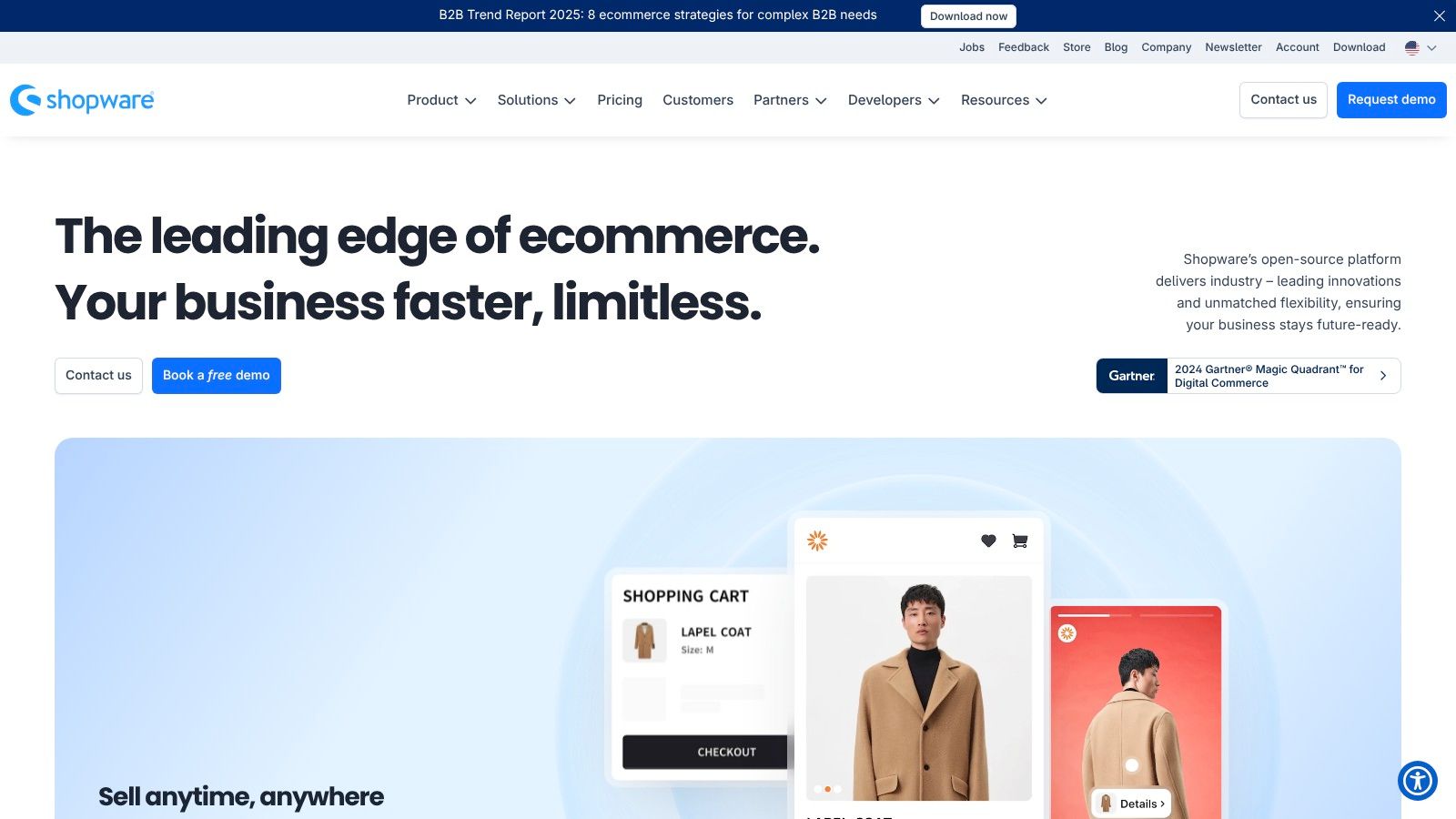
Shopware is a powerful open-source e-commerce platform rapidly gaining traction, particularly in Europe. It combines technical SEO features with robust content marketing capabilities, making it an attractive option for businesses seeking to enhance their online presence. Its strong SEO foundation makes it worthy of consideration, offering advanced features often found in enterprise-level platforms.
One of Shopware's strengths is its advanced SEO toolkit. It provides robust structured data implementation, helping search engines understand your product information and display rich snippets, thereby improving click-through rates. Shopware also allows for highly customizable URL structures and automatic canonical tags, minimizing duplicate content issues. Built-in SEO analysis tools offer valuable insights to optimize your content effectively.
For content marketers, Shopware's Shopping Experiences feature is invaluable. This intuitive drag-and-drop interface allows you to create visually engaging, content-rich landing pages optimized for specific keywords and target audiences. You can build dedicated landing pages for seasonal promotions, product launches, or customer segments without needing advanced coding skills. This empowers you to attract organic traffic and engage customers with compelling content.
Key Features and Benefits
Here’s a breakdown of what makes Shopware a compelling platform:
- Advanced structured data implementation: Enhance search visibility with rich snippets.
- Customizable URL structures and redirects: Control your site architecture and minimize duplicate content.
- Shopping Experiences for content-rich pages: Easily create engaging landing pages.
- Built-in SEO analysis tools: Monitor performance and identify areas for improvement.
- Multi-language SEO support: Expand your reach into international markets.
Pros and Cons: A Balanced Perspective
Like any platform, Shopware has its strengths and weaknesses:
Pros:
- Excellent content marketing capabilities: Create engaging, SEO-driven content.
- Strong technical SEO foundation: Optimize your website for peak search performance.
- Modern architecture with good performance: Deliver a fast, seamless user experience.
- Open-source flexibility with commercial support: Benefit from community contributions and professional assistance.
Cons:
- Smaller ecosystem than competitors (like Shopify): Fewer readily available plugins and integrations.
- Less name recognition in North America: Finding experienced developers can be challenging.
- Steeper learning curve: Mastering all features may require time and effort.
- Smaller pool of experienced developers: Compared to more established platforms.
Pricing and Technical Requirements
Shopware offers various editions, including a free Community Edition and paid plans (Professional, Enterprise) with increasing features and support. Visit the Shopware website for detailed pricing. The open-source version allows flexibility in infrastructure costs, while cloud-hosted options offer simpler setup and maintenance. The self-hosted version requires a web server (Apache or Nginx), PHP, and a MySQL database. Check the Shopware website for detailed specifications.
Implementation and Setup Tips
To make the most of Shopware, consider these tips:
- Plan your site structure carefully: Utilize Shopware's flexible URL structure for a clear, logical hierarchy.
- Use the Shopping Experiences feature: Build dedicated landing pages for campaigns and target audiences.
- Explore plugins and integrations: Extend Shopware's functionality to meet your needs.
- Consider hiring a Shopware expert: Professional help can streamline setup and optimization if needed.
Shopware vs. Shopify: A Quick Comparison
Compared to platforms like Shopify, Shopware provides greater flexibility and control over technical aspects. Shopify excels in ease of use and a vast app ecosystem, while Shopware empowers users with advanced SEO and content creation features. Shopware might be a suitable alternative for Shopify users seeking more control and scalability.
Shopware is an excellent choice for businesses prioritizing SEO and content marketing. Its features, flexible architecture, and open-source nature make it a powerful platform for online growth and building a successful online presence.
8. PrestaShop
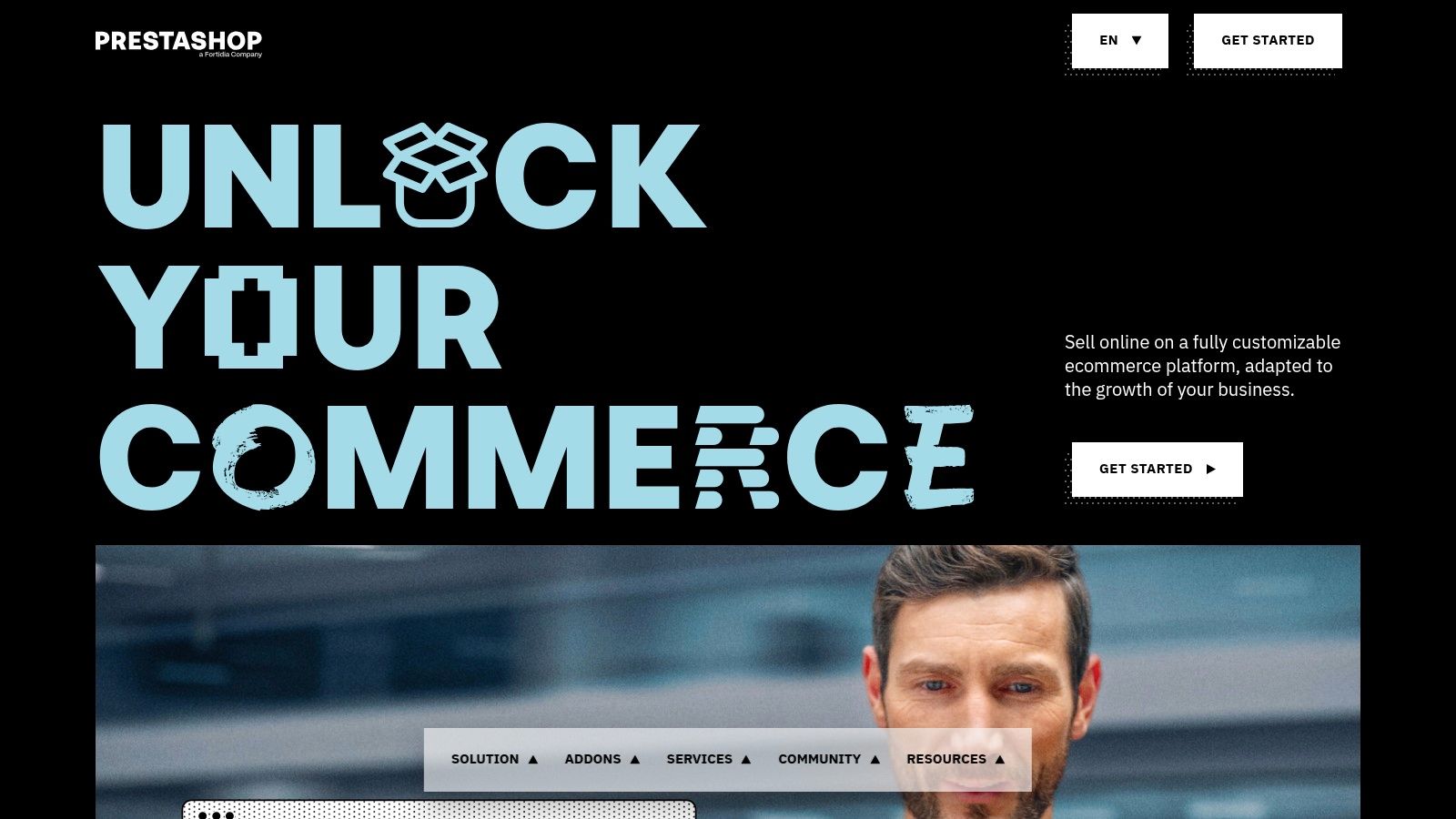
PrestaShop is a powerful open-source e-commerce platform built with international SEO in mind. This makes it an excellent choice for businesses targeting global markets. Unlike platforms that treat internationalization as an afterthought, PrestaShop integrates it seamlessly into its core functionality.
PrestaShop provides a robust and flexible solution for e-commerce entrepreneurs, digital marketers, and online retailers. It's especially beneficial for those with dropshipping businesses or existing Shopify stores looking for more control and international reach. Content creators will find the granular SEO controls particularly useful, allowing them to optimize content for maximum search visibility. Product managers will also appreciate PrestaShop’s adaptability to diverse product catalogs and the complexities of international markets.
Core Strengths and Features
PrestaShop excels in managing multilingual SEO. Features such as customizable meta information (titles, descriptions, keywords), SEO-friendly URL options, and built-in 301 redirect management empower you to tailor your SEO strategy for specific languages and regions. Imagine managing an online store selling handcrafted goods in multiple languages, each optimized for local search terms. This level of control improves your visibility and chances of ranking higher in relevant search results.
PrestaShop also provides integrated image optimization tools. Optimized images are crucial for SEO and user experience. Fast-loading images improve page speed scores, directly influencing search rankings and conversion rates.
Open-Source Flexibility and Cost
The core PrestaShop software is free to download and use. This open-source nature offers significant customization and control. However, many essential features, including advanced SEO functionalities like faceted navigation with SEO controls and advanced URL configuration, are available as paid modules through PrestaShop's marketplace. This modular approach lets you select and pay only for necessary features. Keep in mind, however, that this can affect the overall cost depending on your specific needs, especially compared to platforms with all-inclusive pricing like Shopify.
Technical Considerations and Support
PrestaShop offers a degree of technical freedom not typically found in SaaS platforms. This means some technical expertise, or a developer, is needed for optimal configuration and maintenance. Performance is also highly dependent on hosting quality, so choosing a reliable hosting provider is critical. PrestaShop has an active community offering free support, but dedicated support requires a paid subscription.
Pros:
- Free open-source core: Lower initial investment.
- Strong international and multi-language capabilities: Perfect for global businesses.
- Active community support: Access to a wealth of resources.
- No transaction fees: PrestaShop doesn't take a cut of your sales.
Cons:
- Many essential features require paid modules: Can increase the overall cost.
- Performance depends heavily on hosting quality: Careful hosting selection is needed.
- Requires technical knowledge for optimal configuration: May require a developer.
- Support primarily through community unless paid support purchased: Dedicated support has an extra cost.
Implementation Tip:
Before fully launching a PrestaShop store, download the free version and set up a test environment. This allows you to explore the platform, assess the technical requirements, and decide if it aligns with your business needs and technical capabilities.
Website: https://www.prestashop.com
PrestaShop's strength lies in its international SEO focus and its flexible, open-source architecture. While it requires more technical involvement than other platforms, the customization options and robust multi-language support make it a powerful choice for businesses with global ambitions. If you're comfortable with technical setup and prioritize international markets, PrestaShop is definitely worth exploring.
Top 8 Ecommerce SEO Platforms: Core Features Comparison
| Platform | Core Features ✨ | User Experience ★ | Value Proposition 💰 | Target Audience 👥 | Unique Selling Points 🏆 |
|---|---|---|---|---|---|
| Shopify | Custom URLs, auto sitemap, mobile themes | User-friendly, fast load ★★★ | Robust SEO & analytics; subscription fees | Beginners, SMBs | Large app ecosystem |
| WooCommerce | Full code access, SEO plugin integration | Highly customizable but tech-intensive ★★☆☆ | Free core with flexible customization | SEO experts, WordPress users | Complete open-source control |
| BigCommerce | Custom URLs, 301 redirects, AMP, CDN | Enterprise-level efficiency ★★★★ | Powerful built-in SEO; higher pricing | Mid-to-large enterprises | No transaction fees, multi-channel |
| Magento (Adobe Commerce) | Advanced URL rewriting, canonical tags, layered navigation | Highly flexible but technical ★★☆☆ | Unlimited customization; high implementation cost | Large businesses, enterprises | Complex catalog management |
| Wix eCommerce | SEO Wiz, custom meta tags, structured data | Very user-friendly, drag & drop ★★★★ | Integrated marketing; accessible pricing | Beginners, SMEs | Guided SEO setup |
| Squarespace Commerce | Clean code, SSL, auto sitemap, structured data | Beautiful templates, intuitive ★★★★ | All-in-one solution with hosting; higher entry cost | Design-focused brands | Stunning design, 24/7 support |
| Shopware | Structured data, custom URLs, Shopping Experiences | Modern architecture; learning curve ★★★ | Strong content marketing; scalable | European brands, creative merchants | Rich, SEO-optimized landing pages |
| PrestaShop | Custom meta, SEO-friendly URLs, multi-language support | Community-driven but technical ★★☆☆ | Free open-source core; paid modules for extras | Global businesses, tech-savvy | International SEO capabilities |
Choosing Your Best SEO Ecommerce Platform
Selecting the right ecommerce platform is crucial for your online store's success. With numerous options available, from Shopify and WooCommerce to BigCommerce and Magento, finding the perfect fit depends on your specific business needs and available resources. When comparing platforms like Shopify, WooCommerce, BigCommerce, Magento, Wix eCommerce, Squarespace Commerce, Shopware and PrestaShop, consider the following key factors:
-
Ease of Use and Implementation: Some platforms, like Shopify and Wix, are known for their user-friendly interfaces and straightforward setup. Others, like Magento and Shopware, offer greater customization options but require more technical expertise. Consider your team's skills and the time you can allocate to platform management.
-
Scalability and Growth: If you anticipate rapid business growth, choose a platform that can scale accordingly. Platforms like BigCommerce and Magento are designed for high-volume sales and provide robust features for managing large product catalogs.
-
SEO Features and Customization: Evaluate the built-in SEO capabilities of each platform. Look for features like customizable URLs, meta descriptions, and schema markup. Consider whether the platform allows you to optimize product descriptions, category pages, and blog posts for relevant keywords.
-
Budget and Resources: Platform costs vary significantly. Factor in monthly subscription fees, transaction fees, and any additional expenses for apps or extensions. Consider the resources you'll need for design, development, and ongoing maintenance.
-
Integrations and Compatibility: Ensure the platform integrates seamlessly with your existing business tools and systems, such as your CRM, email marketing platform, and inventory management software. Check compatibility with payment gateways, shipping providers, and other essential services.
By carefully considering these factors, you can select an ecommerce platform that sets your online store up for SEO success. Remember that your platform is the foundation of your online presence, so choosing wisely is essential for long-term growth and profitability.
Key Takeaways
-
Prioritize Your Needs: Identify the must-have features and functionalities based on your specific business model and target audience.
-
Consider Scalability: Choose a platform that can handle your projected future growth and expansion.
-
Balance Ease of Use with Customization: Find the right balance between user-friendliness and the flexibility to tailor the platform to your specific business requirements.
-
Factor in Budget and Resources: Evaluate the total cost of ownership, including subscription fees, development costs, and ongoing maintenance expenses.
-
Ensure Seamless Integration: Verify compatibility with your current business tools and essential services.
Ready to enhance your product descriptions and optimize your chosen ecommerce platform for maximum impact? Transform product images into captivating, SEO-friendly descriptions with DescriptionLab. Leverage the power of AI to boost online conversions and increase your e-commerce sales. Start generating compelling product descriptions today!
